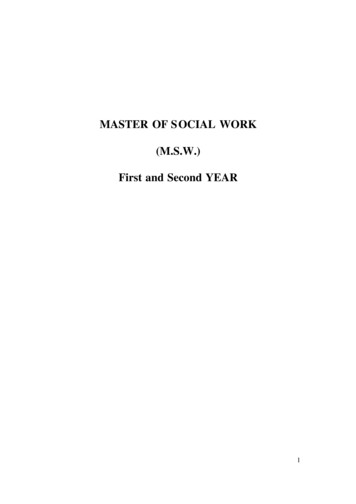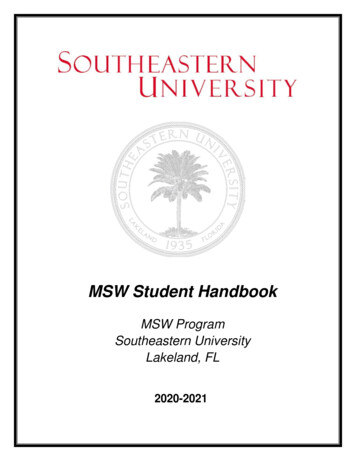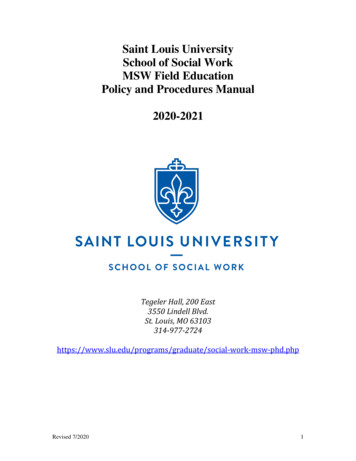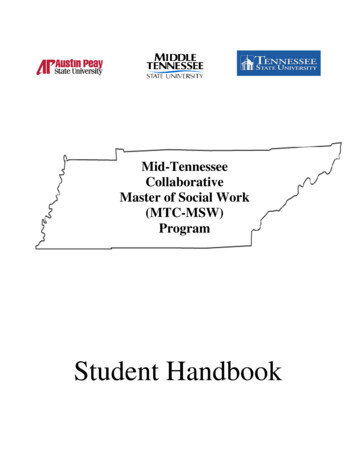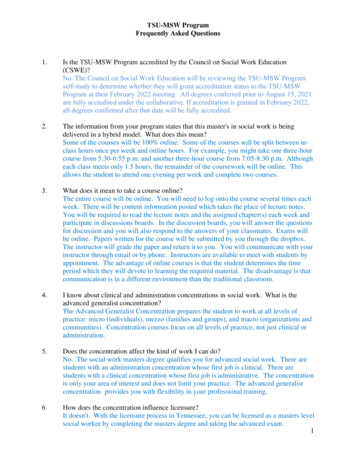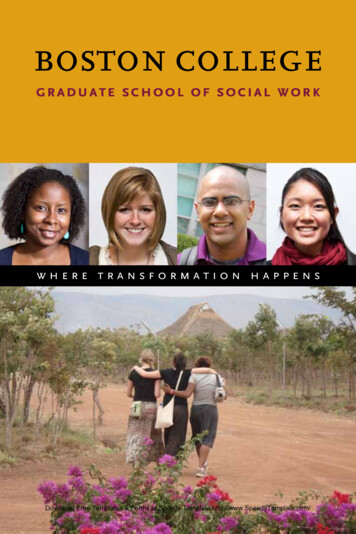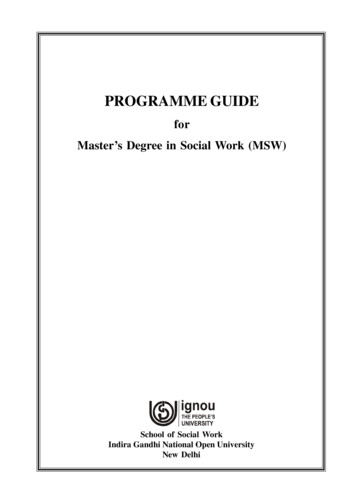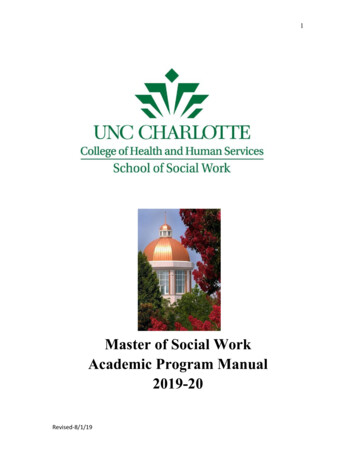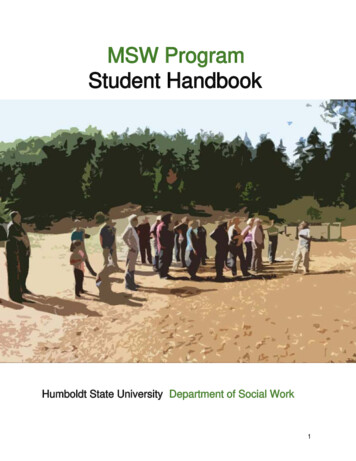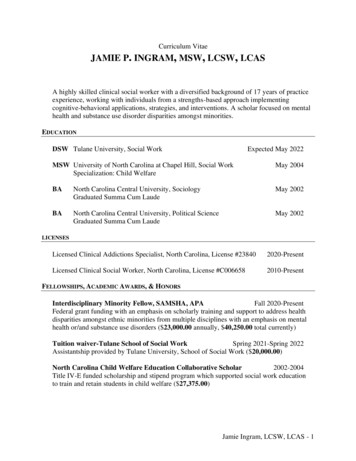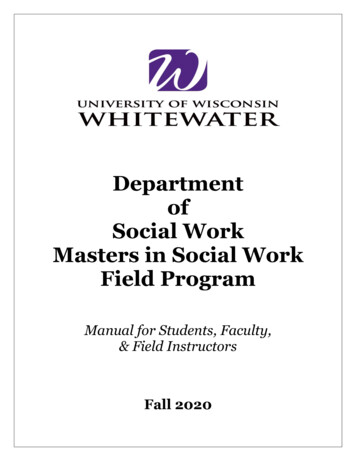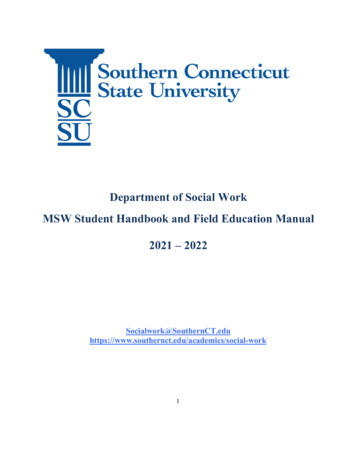
Transcription
Department of Social WorkMSW Student Handbook and Field Education Manual2021 – t.edu/academics/social-work1
TABLE OF CONTENTSABOUT SOUTHERN6Southern Connecticut State UniversitySchool of Graduate and Professional StudiesCollege of Health and Human ServicesDepartment of Social WorkUNIVERSITY POLICIES66677Academic HonestyFamily Education Rights and Privacy Act (FERPA)Identification CardsNondiscrimination PolicyParking and Traffic RegulationsPolicy Statement on PluralismResearch Protection ProgramSexual Harassment Prevention PolicyStudent MisconductTobacco-Free and Vape-Free CampusUNIVERSITY SERVICES778888999910Academic CalendarAcademic Success Center Writing SupportAlert Notification SystemBannerWebBlackboard Learn 9Campus MapCommunity Alliance for Research and Engagement (CARE)Disability Resource Center (DRC)Email AccountsGraduate Student Affairs Committee (GSAC)Information Technology Help DeskLibrary ServicesOffice of Psychological AssessmentUndocumented Student Support TeamUniversity PoliceShuttle ServiceVeterans’ ServicesOther Student Services1010101010101011111111111112121212122
MSW PROGRAM13MSW MissionMSW CurriculumSocial Work CompetenciesAdvanced Standing ProgramDual Degree MSW/MA in Women’s & Gender StudiesMSW POLICIES131414141415Accommodations for DisabilitiesAccommodations for Observance of Religious Holy DaysAdvising GuidesAttendance PolicyCapstone ExperienceClass SchedulesCOD Cohort ProgramDirected Independent StudyConfidentiality and RecordingsGraduationHIPAA Privacy RuleIncomplete CourseLeave of AbsencePrior LearningTime Limitation to Complete ProgramTransfer CreditWithdrawal from a CourseWithdrawal from the UniversityEVALUATION OF STUDENT rofessional Standards: Essential Abilities and AttributesAcademic StandardsAcademic Probation and DismissalStudent Review CommitteeAppeal of a GradeSTUDENT ACTIVITIES192020212323Beta Rho Chapter, Phi Alpha National Social Work Honor SocietyDepartment CommitteesGraduate Social Work Organization (GSWO)Rapid Response Team (RRT)232323233
FIELD EDUCATION24Field Education CurriculumApplication ProcessField Selection ProcessBackground ChecksEmployed Field PlacementsField Placement SchedulesField Placement Start DateField AgenciesField SupervisorsResponsibilities of Field SupervisorsSeminar for Field Instruction (SIFI)Library AccessStudentsResponsibilities of StudentsAttendance in Field PracticeFaculty LiaisonsEvaluation of Field PracticeMSW TECHNICAL STANDARDS2424252525262627272727272828292929304
MSW STUDENT HANDBOOK AND FIELD EDUCATION MANUAL2020-2021The MSW Student Handbook and Field Education Manual is intended to provide general information andguidance only. The Handbook does not constitute a contract, either expressed or implied, and is subject torevision without prior notice at the discretion of the University or the Department of Social Work. Pleaseconsult the Graduate Catalog, the MSW Program Coordinator, or the Field Education Director for furtherinformation.5
ABOUT SOUTHERNSouthern is located at 501 Crescent Street, New Haven, CT 06515For a campus map, please visit: https://www.southernct.edu/campus-mapSouthern Connecticut State UniversitySouthern provides exemplary graduate and undergraduate education in the liberal arts and professionaldisciplines. As an intentionally diverse and comprehensive University, Southern is committed to academicexcellence, access, social justice, and service for the public good.Founded in 1893 as the New Haven Normal School, Southern today is authorized by the ConnecticutGeneral Assembly to offer courses and programs leading to bachelor's and master’s degrees in the arts andsciences and in various professional fields. Southern also offers a sixth-year diploma in several specializedareas and three professional doctorates, including the Doctor of Social Work (DSW).Southern Connecticut State University is one of the Connecticut State Colleges and Universities (CSCU)governed by the Board of Regents for Higher Education. Southern is accredited by the New EnglandAssociation of Schools and Colleges (NEASC) through its Commission on Institutions of Higher Education.School of Graduate and Professional StudiesSouthern offers graduate programs in over 55 areas of study in the fields of business, education, STEM,health and human services, and the liberal arts. The mission of the School of Graduate and ProfessionalStudies is to support students in their advanced study and research within a chosen field of specialization asthe foundation for successful professional careers.6
College of Health and Human ServicesThe College of Health and Human Services values interdisciplinary education, practice-based learning, andcommunity-based participatory research practices. Each field of study is attentive to the workforce needs ofour state and region, and partners extensively with agencies and organizations in New Haven neighborhoodsand throughout the state of Connecticut to address health priorities and achieve equity. The College iscomprised of 15 distinct disciplines housed within departments, centers, clinics, and institutes. For furtherinformation, please visit: partment of Social WorkThe Department of Social Work offers professional education for every stage of a social worker’s career.The BSW program prepares students for entry-level professional social work positions and for advancementto graduate social work education. The MSW program prepares students for specialized clinical andcommunity practice. The DSM program prepares master’s-level social workers for advanced clinicalpractice, university teaching, and leadership and management. The BSW and MSW Programs are accreditedby the Council on Social Work Education (CSWE). For further information, please workUNIVERSITY POLICIESSouthern Connecticut State University provides an equal opportunity for higher education for all qualifiedstudents. The University affirms the basic right of all members of the University community to free inquiry,responsible discussion, and the uninterrupted pursuit of all activities normally associated with the operationof Southern Connecticut State University. It is the responsibility of the student to become familiar with andkeep informed about the policies and regulations of the University and the School of Graduate andProfessional Studies, as well as the requirements of the MSW program. While the faculty andadministration of Southern will assist a student whenever possible, regulations will not be waived norexceptions granted because a student is ignorant of regulations or claims that information was not providedby an adviser. Southern Connecticut State University, through its offices and/or appropriate committees,may suspend or dismiss any student from the University for reasons of scholarship, aptitude, conduct, orhealth. It is also the responsibility of the student to determine the requirements of state and federalgovernment agencies for professional certifications.The Connecticut State University System has certain self-defining institutional values. Principal amongthese is respect for the dignity, rights, and individuality of each member of our University community. Allmembers of our University community are expected to govern their social and academic interactions withtolerance and mutual respect. For further information, please al-information/university-information.htmlAcademic HonestyThe integrity of scholarship is the cornerstone of the academic and social structure of the University. It isthe expressed policy of the University that every aspect of graduate academic life, related in whateverfashion to the University, shall be conducted in an absolutely and uncompromisingly honest manner.Violations of academic honesty are grounds for a failing grade and may result in dismissal from the MSWprogram and the School of Graduate and Professional Studies. For further information, please al-information/academic-standards.html7
Family Education Rights and Privacy Act (FERPA)The Family Educational Rights and Privacy Act (FERPA) (20 U.S.C. 1232g; 34 CFR Part 99) is a federallaw that protects the privacy of student education records. The law applies to all schools that receive fundsunder an applicable program of the U.S. Department of Education. For further information, please t/ferpaIdentification CardsThe Southern Hoot Loot ID card is the primary University identification card, mandatory for all students. Inaddition, the Hoot Loot ID card functions as a library card. The card also contains each student's uniqueeight-digit University identification number. Students currently registered may obtain the Southern HootLoot ID card by visiting the University Card Office, located in the Wintergreen Building. For furtherinformation, please visit: https://hootloot.southernct.edu/Nondiscrimination PolicySouthern Connecticut State University does not discriminate on the basis of age; ancestry, color; genderidentity and expression; intellectual disability; learning disability; mental disorder; physical disability;marital status, national origin; race; religious creed; sex, including pregnancy, transgender status, sexualharassment and sexual assault; sexual orientation; veteran status; or any other status protected by federal orstate laws. The following person has been designated to handle inquiries regarding the non-discriminationpolicies: Paula Rice, Director/Title IX Coordinator, Office of Diversity & Equity Programs, 501 CrescentStreet, BU 240, New Haven, CT 06515, (203)392-5568, ricep1@southernct.edu. For further information,please visit: https://inside.southernct.edu/diversityParking and Traffic RegulationsAll students who desire to park on campus must properly display a campus parking decal on their vehicle.Limited campus parking facilities require strict compliance with assigned areas. Vehicles parked inviolation of the Traffic and Parking Regulations are subject to a fine and/or a State motor vehicle infractionand towing at the owner's expense. In order to facilitate better use of existing parking areas and to enhancepersonal safety, the University offers a shuttle service during day and evening hours. For furtherinformation, please visit “Campus cy Statement on PluralismSouthern Connecticut State University adopted a policy statement on pluralism which forbids acts ofviolence or harassment reflecting bias or intolerance based on an individual's race, religious creed, gender,sexual orientation, disability, and ethnic or cultural origin. The University has also adopted procedures forinvestigating complaints of acts of intolerance brought by students or staff. For further information, pleasevisit: tement-pluralismResearch Protection Program (RPP)The University requires moral and ethical behavior and integrity in all research performed by its faculty,students and staff. The RPP is accountable for assuring conformity with both federal and Universityresearch protection policies and procedures. The following RPP divisions promote and maintain appropriatemanagement and oversight of SCSU research activities according to federal codes and institutionalrequirements. For further information, please visit: https://inside.southernct.edu/rpp8
The Office of Research Integrity (ORI) advances and monitors the responsible conduct ofresearch for all SCSU research projects. The office acts on substantive allegations of researchmisconduct and serves as the Office of the Research Integrity Officer (RIO).The Institutional Review Board (IRB) safeguards the rights and welfare of human participants inresearch. Investigators engaging in human participant research must submit a project proposalwhich will be examined for requisite compliance and assigned a disposition. Recruitment of humanparticipants for research cannot proceed without IRB approval or exemption.The Institutional Animal Care and Use Committee (IACUC) is responsible for tending to thecare and welfare of vertebrate animals used in research. Investigators engaging in vertebrate animalresearch must submit a project proposal which will be examined for requisite compliance andassigned a disposition. Animal research may not be initiated without IACUC approval.The Collaborative Institutional Training Initiative (CITI) Program provides members of theSouthern community with free training in human subjects or animal research, responsible conductof research, research administration, conflicts of interest and other topics. Modules are available forboth initial and retraining purposes.Sexual Harassment Prevention PolicyAll members of the University community shall conduct themselves in an appropriate manner with concern,dignity, and respect for others. The University community includes students, employees, and nonemployees when they conduct business on University property.Sexual harassment may occur between employee and employee, employee and student, or student andstudent. Complaints of sexual harassment within the University will be taken seriously and investigated.Any member of the University community who violates this policy is subject to the full range ofdisciplinary action. Sexual harassment in some instances need not be intentional to violate this policy.In the event of a charge of sexual harassment, a defense based upon consent when the facts establish anemployee/student or supervisor/employee relationship existed will be given little weight. Since anysignificant power differential between members of the University community makes voluntary consentquestionable, members of the faculty and staff are expected to be aware of their professional responsibilitiesand avoid apparent or actual conflict of interest.An individual with a complaint concerning sexual harassment has a right to be heard. By means of theseprocedures, the university provides an opportunity for an individual (Complainant), without fear ofretaliation, to express a complaint and to seek a prompt and equitable resolution while protecting the rightsof the person against whom the complaint has been filed (Respondent). These procedures shall be availableto any person who, at the time of the act complained of, was an employee, student, or applicant foremployment or admission to the University. For further information, please cy-procedures-governing-sexual-harassmentStudent MisconductAll students are expected to maintain acceptable standards of conduct while on the University campus, onproperty controlled by the University or University affiliates, and in connection with off-campus Universityactivities. Southern defines student misconduct as behavior that is in violation of regulations established bythe Board of Regents for Higher Education, of University regulations, and of rules governing residence onUniversity property. Graduate students, as citizens, are subject to all federal and state laws, in addition to all9
University regulations governing student conduct and responsibility. A student may be suspended ordismissed from the School of Graduate and Professional Studies for violating laws, rules, or regulations. Inthe event of alleged academic misconduct, the incident will be handled as outlined in the SouthernConnecticut State University Student Handbook. For further information, please o-Free and Vape-Free CampusSmoking, tobacco use, and vaping are prohibited in all facilities and areas of the Southern ConnecticutState University campus with no exception. This includes, but is not limited to, all indoor and outdoorareas and properties. This policy applies to any individual on campus property and is applicable twentyfour hours a day, seven days a week. For further information, please SITY SERVICESAcademic CalendarThe current academic calendar may be found at: ssibility Services (CASAS)Southern Connecticut State University provides reasonable accommodations in accordance with theAmericans with Disabilities Act and Section 504 of the Rehabilitation Act, for students with documenteddisabilities on an individualized basis. The Center for Academic Success and Accessibility Services(CASAS) assists students with documented disabilities to determine appropriate accommodations. Beforereceiving accommodations in a given class, students must schedule an appointment with CASAS and thenmeet with the instructor to plan or review approved accommodations. For further information, please ility-servicesAlert Notification SystemWhen a decision is made to delay opening the University, to cancel classes, or to close the University due toinclement weather or other campus emergencies, a text message and/or email message will be sent to thoseregistered for the Southern Alert Notification System: ebBannerWeb offers students access to their academic records, degree evaluations, registration, studentaccounts, and financial aid. To access information, log into: MySCSU.SouthernCT.edu and click onBannerWeb. For assistance, contact the Help Desk at helpdesk@southernct.edu or (203) 392-5123.Blackboard Learn 9Southern uses Blackboard Learn 9 as its learning management system for courses and organizations. Forassistance in accessing Blackboard Learn 9 and other technological resources, please chnologyCampus MapFor a map of the campus, please visit: https://www.southernct.edu/campus-mapCommunity Alliance for Research and Engagement (CARE)CARE was established in 2007 to identify solutions to health challenges in New Haven and to promote10
health equity through community action research. In a partnership between the SCSU College of Health andHuman Services and Yale Department of Public Health, CARE promotes the prevention of chronic diseaseby focusing on social, environmental, and behavioral risk factors. For further information, please contactAlycia Santilli at Santillia1@southernct.eduEmail AccountsGraduate students at Southern Connecticut State University have access to the University's student e- mailsystem and can access emails at: https://outlook.office.com. Southern uses emails as well as writtencorrespondence as an official method of communication with graduate students. For assistance with loggingin, contact the Help Desk at: helpdesk@southernct.edu or (203) 392-5123.Graduate Student Affairs Committee (GSAC)The Graduate Student Affairs Committee (GSAC) is a student committee comprised of students from thevarious programs within the School of Graduate and Professional Studies. All graduate students arewelcome at meetings and are encouraged to participate. The Graduate Student Affairs Committee isdedicated to enhancing the experience of graduate students. Our goal is to promote individual academicendeavors, as well as collective cultural and social experiences at SCSU. On your behalf, GSAC also acts asan advocacy group to better serve the needs of the graduate student body as a whole. For furtherinformation, please visit: https://inside.southernct.edu/drcInformation Technology Help DeskThe SCSU Information Technology Department supports the campus community in the use of informationand academic technologies, such as BannerWeb, e-mail accounts, library accounts, and classroomtechnologies. For assistance, please contact helpdesk@southernct.edu or call (203) 392-5123.Library ServicesHilton C. Buley Library serves the academic and research needs of the Southern community. Here you’llfind quiet rooms available for individual or group study and reference librarians who specialize in one ormore areas of study. The reference librarian for the Social Work Department is Lisa Bier, who is availableby appointment at: bier1@southernct.edu or (203) 392-5131.The library maintains more than 100 databases and electronic collections, and houses more than half amillion items including books, serials and serial back files, microforms, maps, government documents, rarebooks, video media, and more. The library is home to two computer labs, the Learning Resources Center,Information Technology offices, the Department of Information and Library Science, and a libraryinstruction classroom, and the Owls Perch coffee shop. For further information, please visit:https://libguides.southernct.edu/home/Office of Psychological AssessmentThe Office of Psychological Assessment provides low-cost assessment of learning disabilities, with slidingscale fees ranging from no cost to 100. For further information, please email: opa@southernct.eduUndocumented Student Support TeamWe at Southern are committed to a mission of social justice. That means we strive to ensure that allmembers of our community are treated with dignity, respect, kindness, compassion and civility. Weunderstand DREAMers may have unique questions about attending Southern including issues related toadmissions requirements, financial aid eligibility, and confidentiality. Our support team of faculty, staff, andstudents -- the DREAMers Action Alliance -- has three primary goals: to identify and break down barriers11
faced by undocumented students and their families; to engage the campus community in conversationsabout immigration issues and to educate the community about the realities of being an immigrant in theUnited States; and to advocate for policies that support our students on the campus, state, and national level.For further information, please visit: upport-teamUniversity PoliceThe University Police Department, located on Wintergreen Avenue in Granoff Hall, is open 24 hours a day.University Police officers are responsible for the safety and protection of the campus and its personnel aswell as for enforcing parking regulations and conducting investigations. To seek assistance or to report acrime or other incidents, please call the University Police at 203) 392-5375. Information may also bereported anonymously online by visiting “Silent Witness” at ttle ServiceThe University Police Department provides a shuttle bus service and a 24-hour walking escort service toaccompany students, faculty, and staff to parking lots, residence halls, and other on-campus locations. Forfurther information, please visit: erans’ ServicesSouthern provides a range of services to veterans and military students, including counsel, academicadvisement, GI Bill and Tuition Waiver Certifications and liaison with state and federal agencies. You canobtain information about the GI Bill and laws that provide rehabilitation and educational assistance todisabled or war veterans and their dependents. You can also find out about medical entitlements, dischargeupgrades and other benefits available from the Veterans Administration.The Veterans' Center offers a lively meeting place with computers and comfortable furniture where you canstudy, socialize or relax between classes. The center is located in Engleman Hall, Room A014 and is openweekdays from 8:30 a.m to 6:00 p.m. For further information, please cesOther Student ServicesFor further information, please al-information/student-services/html12
MSW PROGRAMThe Pauline R Lang Social Work Center, 101 Farnham Avenue, New Haven, CT 06515MSW MissionSocial work promotes the personal and social development of people in their communities based on thevalues of social, economic, and environmental justice; civil and human rights; democracy; and full access toeducational, social, economic, and political participation. The Master of Social Work (MSW) programeducates social workers as competent and compassionate agents of change who, guided by professionalknowledge, skills, and values, practice ethically and effectively with diverse individuals, families, groups,organizations and communities. Graduates of the MSW program are prepared to translate research intopractice; to provide leadership in the profession and in their communities; and to collaborate with local andglobal communities in building an inclusive and just society.Goals of the MSW program are to prepare social workers who:1.2.3.4.5.Identify as social workers with a commitment to the values and goals of the professionPractice with integrity, cultural humility, and respect for diverse populationsSeek innovative solutions to human and social needsHold professional social work positions in public service and in private agenciesQualify for the State of Connecticut LMSW licensure examination.13
MSW Curriculum (60 credits)The MSW program is a 60-credit program with concentrations in Clinical Practice and in CommunityPractice: Community Organization, Policy, and Leadership. The MSW program may be completed intwo or three years of full-time study, including 1,100 hours of field practice. Employed students areencouraged to choose the three-year program plan.During the first part of the MSW program, students develop generalist knowledge and skills, and theycomplete 500 hours of field practice (about 20 hours per week) in the fall and spring semesters of anacademic year. During the second part of the program, students develop specialized knowledge and skills,and they complete 600 hours of field practice (about 22 hours per week) in Clinical Practice (with a focus inChildren and Families, Families and Elders, Mental Health and Substance Use: Co-Occurring Disorders, orSocial Work in School Settings); or in Community Practice: Community Organization, Policy, andLeadership. For specific MSW degree requirements and course descriptions, please al Work CompetenciesMSW graduates achieve social work competencies that include the ability to:1.2.3.4.5.6.7.8.9.Demonstrate ethical and professional behaviorEngage diversity and difference in practiceAdvance human rights and social, economic, and environmental justiceEngage in practice-informed research and research-informed practiceEngage in policy practiceEngage with individuals, families, groups, organizations, and communitiesAssess individuals, families, groups, organizations, and communitiesIntervene with individuals, families, groups, organization, and communitiesEvaluate practice with individuals, families, groups, organizations, and communitiesAdvanced Standing Program (39 Credits)Qualified graduates of a CSWE-accredited BSW program may apply for admission with advanced standing.Students who are admitted with advanced standing have demonstrated competencies in generalist socialwork (equivalent to 21 credits) through exemplary performance in their BSW program. In addition, theyhave shown professional maturity through voluntary or employed experience in human services.Advanced standing students complete 39 credits, including a specialized field placement of 700 hours(about 24 hours per week). The advanced standing program may be completed in one calendar year of fulltime study (summer, fall, and spring semesters) or in two academic years of full-time study (two fallsemesters and two spring semesters). Employed students are encouraged to select the two-year plan.Dual Degree MSW/MA in Women’s & Gender Studies (72 Credits)The dual degree in MSW and MA in Women’s & Gender Studies allows students to prepare for social workpractice while exploring and applying research and theory in women’s and gender studies. Academiccoursework, field practice experiences, and mentoring relations afford interdisciplinary opportunities forintegrating methods of scholarly inquiry, critical problem-solving, and leadership development. The dualdegree consists of 72 credits that may be completed in three academic years. Advanced standing studentsmay complete the dual degree in 51 credits taken over two academic years.14
MSW POLICIESAccommodations for DisabilitiesSouthern Connecticut State University provides reasonable accommodations in accordance with theAmericans with Disabilities Act and Section 504 of the Rehabilitation Act, for students with documenteddisabilities on an individualized basis. The Center for Academic Success and Accessibility Services(CASAS) assists students with documented disabilities to determine appropriate accommodations. Beforereceiving accommodations in a given class, students must schedule an appointment with CASAS and thenmeet with the instructor to plan or review approved accommodations. For further information, please ility-servicesAccommodation for Observance of Religious Holy DaysStudents will be excused from class attendance or other requirements if the tenets of their religion forbidsecular activity on the particular day or time of day of the class session. Students requesting a religiousaccommodation should consult with the instructor to arrange for the excused absence and for making upmissed work.Advising GuidesUpon admission to the MSW program, students are provided with advising guides that specify the coursesto be taken in each semester for two-year, three-year, advanced standing, and dual degree program plans.Students who take courses out of sequence risk delaying their anticipated date of graduation. Therefore,students are responsible for foll
The MSW Student Handbook and Field Education Manual is intended to provide general information and guidance only. The Handbook does not constitute a contract, either expressed or implied, and is subject to revision without prior notice at the discretion of the University or the Department of Social Work. Please consult the Graduate Catalog, the MSW Program Coordinator, or the Field Education .
